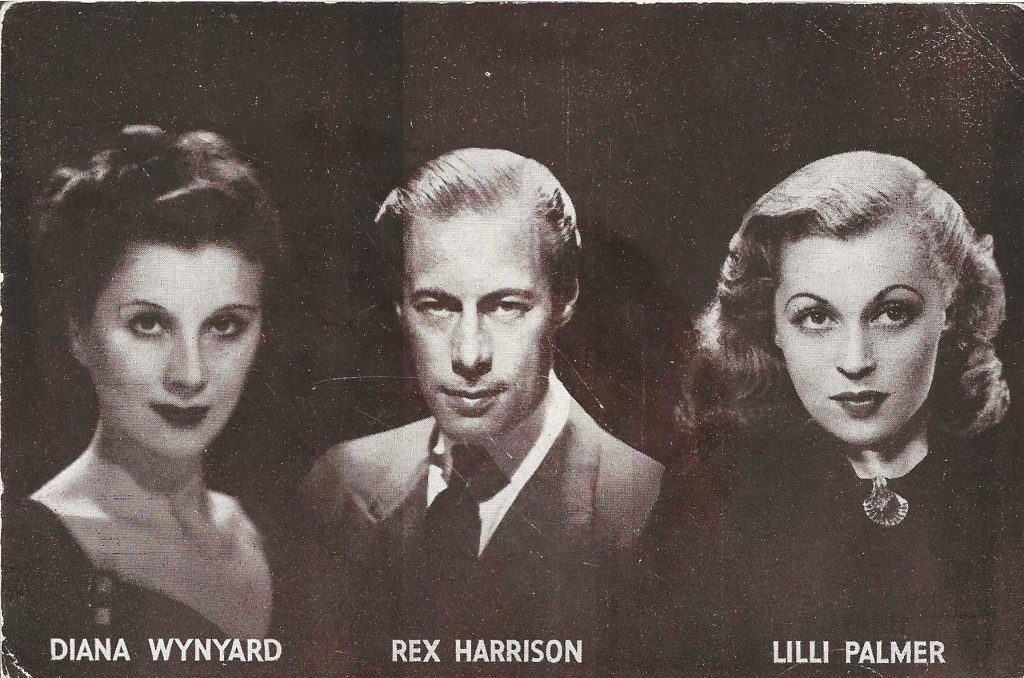George “Burt” Martin
A Very Peculiar Postcard
The narrative about to be told here has happened to every collector. The story starts at a long-forgotten postcard show and ends with a question. The question is, “Why did I buy this?”
You look at the card one last time and put it back in your collection as if you know exactly why you’re doing it. You wouldn’t think of dropping it into the trash can; you put it back in your collection. Why?

This is the most recent card I have put in my “I do not have a clue why I’m keeping this card” category.
I have never researched the card before, but I do collect theatre advertising postcards from the United Kingdom, France, and the United States. The production being advertised is No Time For Comedy. It is also a theatre ad for the Haymarket Theatre in London.
Here’s the hitch: in a close examination of the productions list at the Haymarket, which dates back to 1720 (the Haymarket is the third oldest theatre in London) the play No Time For Comedy was never performed there.
The three actors pictured on the card are people whose names we recognize, but we remember them for work they did on other projects. Today, Rex Harrison is best remembered for his role in My Fair Lady as Henry Higgins, a cantankerous college professor who tries to win a bet by teaching Eliza Doolittle, a Cockney flower girl played by Audrey Hepburn, how to behave in high society.
Diana Wynyard was the first British actress to be nominated for the best actress Oscar (Academy Award). Her work in 1933 in the extraordinary film version of Noel Coward’s Cavalcade set performance standards for the next decade. After World War II Ms. Wynyard returned to the stage as a Shakespearean leading lady. Her most memorable performance came when she portrayed Lady Macbeth. There had been rumors about this 1948 production being “cursed,” and much to everyone’s delight she told reporters that it was “nonsense.” The next day in the sleepwalking scene of “Macbeth,” she fell, 15 feet into the orchestra pit. Happily she was not injured and after a brief costume adjustment the performance continued.
Born in Germany to a surgeon and an Austrian stage actress, Lilli Palmer began her career in films produced in England. She married Rex Harrison in 1943 and followed him to Hollywood to act in Warner Bros. Pictures’ blockbuster productions Cloak and Dagger (1946) and Body and Soul (1947). Her most memorable stage performance came in the early 1950s when she and Harrison appeared in the Broadway hit, Bell, Book, and Candle.
The stage play No Time for Comedy was written by first generation American Samuel N. Behrman, whose parents came to America to live in Worchester, Massachusetts, where Samuel was born in 1893.
Behrman’s life was both calamitous and triumphant. His college years were tedious in many ways, most notably for his several suspensions from Clark University for failing mandatory physical education requirements. He remedied his suspensions by transferring to Harvard. Enrolling in Harvard opened the door to a successful career that included 26 plays, four books, and 28 screen plays (movies). His biographer was his stepdaughter, Barbara Gleb who also authored a biography of the playwright Eugene O’Neill.
The play No Time for Comedy figured prominently in Behrman’s life for a very short time, namely 1938, ’39, and 1940. It was written, staged, and filmed in just three years. The movie, starring Jimmy Stewart and Rosalind Russell, far surpassed the stage performances. As a matter of fact, other than the 179 Broadway performances at the Barrymore Theatre starting in April 1939, with Laurence Olivier and Katharine Cornell in the star roles, no other productions are mentioned with one single exception.
The text that appears as the message on this card, lists the names of three actors who played lesser parts in a 1941, London production of No Time for Comedy. They were Walter Fitzgerald, Denys Blakelock, and Elisabeth Welch. In a thumbnail sketch of Welch’s career, No Time For Comedy is included as a work project at the Comedy Theatre in London. It could be that the production was moved from the Haymarket to the Comedy Theatre, because at that time Noel Coward’s Design For Living was enjoying a long-run at the Haymarket.
***
PS: I have yet to remember where I bought this card, but I think I know why. But that’s a story for a different time.
I remember Rex Harrison for his performance in the title role of the 1967 film Doctor Dolittle and for commercials promoting the Dodge Aspen during the 1970’s.
My wife and I went to London on our honeymoon in 1983. Looking in the paper we saw that Rex Harrison was appearing in the George Bernard Shaw play, Heartbreak House. Costarring with Rex were the lovely Diana Rigg, Simon Ward, and Rosemary Harris. It was a great evening of theater. Harrison in addition to starring in My Fair Lady on Broadway and the movie version, also starred in Shaw’s Major Barbara. While in London, we also saw The Mousetrap and the farce, No Sex Please, We’re British.